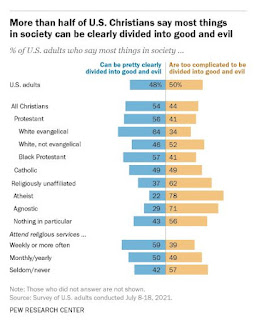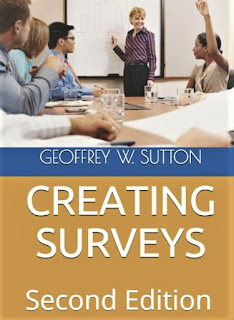Graphic from Pewresearch 2021
Pew Researchers have a great deal of experience in asking people questions. Formulating a good question for a survey is an important place to begin.
However, another lesson from Pew is the additional data they gather. I noticed a large graphic illustrating how people in different groups answered one question. When conducting survey research it is critical to consider what we need to know about the people responding to a question or item to understand the meaning of their response.
Consider Pew's survey item with two choices: "most things in society...
Can be pretty clearly divided into good and evil
Are too complicated to be divided into good and evil
The graphic shows how different groups responded and allows for comparisons on the two ways to respond.
Later, in the article, they compare political affiliations, which in the US means Republican and Democrat. This is worth studying as well.
The article is worth reading to learn more about framing a survey question, creating a meaningful graphic, and summarizing results for an educated public. Link PEWRESEARCH 2021
Reference
Ausubel, J. (2021, Dec 21). Christians, religiously unaffiliated differ on whether most things in society can be divided into good, evil. Retrieved from www.pewresearch.orgBuy Creating Surveys on
and see my books on AMAZON or GOOGLE
STORE
Also,
consider connecting with me on FACEBOOK Geoff W. Sutton
TWITTER @Geoff.W.Sutton
You can read many published articles at no charge:
Academia Geoff W Sutton ResearchGate
Geoffrey
W Sutton


Comments
Post a Comment